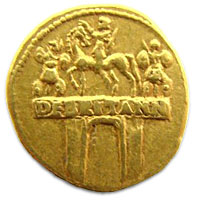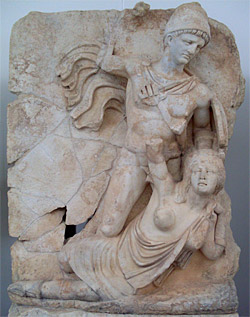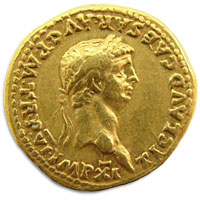INVASION
In AD 43, following a delay caused by initial misgivings amongst the troops, a Roman army, commanded, on behalf of Emperor Claudius, by Aulus Plautius, set sail from Gaul to invade Britain.[*] The story – the only surviving account of the invasion – is told by Cassius Dio:
Their delay, however, had made their departure late in the season. They were sent over in three divisions, in order that they should not be hindered in landing – as might happen to a single force – and in their voyage across they first became discouraged because they were driven back in their course, and then plucked up courage because a flash of light rising in the east shot across to the west, the direction in which they were sailing. So they put in to the island and found none to oppose them. For the Britons as a result of their inquiries had not expected that they would come, and had therefore not assembled beforehand. And even when they did assemble, they would not come to close quarters with the Romans, but took refuge in the swamps and the forests, hoping to wear out the invaders in fruitless effort, so that, just as in the days of Julius Caesar, they should sail back with nothing accomplished.
inv01
Plautius, accordingly, had a deal of trouble in searching them out; but when at last he did find them, he first defeated Caratacus and then Togodumnus, the sons of Cynobellinus [Cunobelin], who was dead. (The Britons were not free and independent, but were divided into groups under various kings.) After the flight of these kings he gained by capitulation a part of the Bodunni [Dobunni?] tribe, who were ruled by the Catuellani [Catuvellauni]; and leaving a garrison there, he advanced farther and came to a river. The barbarians thought that the Romans would not be able to cross it without a bridge, and consequently bivouacked in rather careless fashion on the opposite bank; but he sent across a detachment of Celts, who were accustomed to swim easily in full armour across the most turbulent streams.[*] These fell unexpectedly upon the enemy, but instead of shooting at any of the men they confined themselves to wounding the horses that drew their chariots; and in the confusion that followed not even the enemy’s mounted warriors could save themselves. Plautius thereupon sent across Flavius Vespasian also (the man who afterwards became emperor) and his brother Sabinus, who was acting as his lieutenant. So they, too, got across the river in some way and killed many of the foe, taking them by surprise. The survivors, however, did not take to flight, but on the next day joined issue with them again. The struggle was indecisive until Gnaeus Hosidius Geta, after narrowly missing being captured, finally managed to defeat the barbarians so soundly that he received the ornamenta triumphalia, though he had not been consul. Thence the Britons retired to the river Thames at a point near where it empties into the ocean and at flood-tide forms a lake. This they easily crossed because they knew where the firm ground and the easy passages in this region were to be found: but the Romans in attempting to follow them were not so successful. However, the Celts swam across again and some others got over by a bridge a little way up-stream, after which they assailed the barbarians from several sides at once and cut down many of them. In pursuing the remainder incautiously, they got into swamps from which it was difficult to make their way out, and so lost a number of men.
Shortly afterwards Togodumnus perished, but the Britons, so far from yielding, united all the more firmly to avenge his death. Because of this fact and because of the difficulties he had encountered at the Thames, Plautius became afraid, and instead of advancing any farther, proceeded to guard what he had already won, and sent for Claudius. For he had been instructed to do this in case he met with any particularly stubborn resistance, and, in fact, extensive equipment, including elephants, had already been got together for the expedition.Roman History LX, 19–21
Plautius’ sudden attack of ‘fear’ seems rather convenient, allowing, as it does, Claudius to save the day. There must be a strong possibility that it had been arranged, from the beginning, for Claudius to have the glory of capturing the enemy’s capital. At any rate, he eventually arrived in Britain —
inv02
When the murder of Gaius [better known as Caligula; Claudius’ predecessor] was announced, although many urged Galba to take advantage of the opportunity, he preferred quiet. Hence he was in high favour with Claudius, became one of his staff of intimate friends, and was treated with such consideration that the departure of the expedition to Britain was put off because Galba [who eventually did become emperor, in 68] was taken with a sudden illness, of no great severity.It seems a reasonable assumption that it was the departure of Claudius’ party, not the main invasion force, that was delayed by Galba’s indisposition. Cassius Dio describes Claudius’ route:Lives of the Twelve Caesars ‘Galba’ 7
He sailed down the river [Tiber] to Ostia, and from there followed the coast to Massilia [Marseilles]; thence advancing partly by land and partly along the rivers, he came to the ocean and crossed over to Britain …According to Suetonius, the journey was not without incident:Roman History LX, 21
On the voyage thither from Ostia he was nearly cast away twice in furious north-westers, off Liguria and near the Stoechades Islands. Therefore he made the journey from Massilia all the way to Gesoriacum [Boulogne] by land, crossed from there …Since Claudius sailed from Boulogne, it is generally assumed that the invasion force did too.Lives of the Twelve Caesars ‘The Deified Claudius’ 17
— and:
… he joined the legions that were waiting for him near the Thames. Taking over the command of these, he crossed the stream, and engaging the barbarians, who had gathered at his approach, he defeated them and captured Camulodunum [Colchester, Essex], the capital of Cynobellinus. Thereupon he won over numerous tribes, in some cases by capitulation, in others by force, and was saluted as imperator several times, contrary to precedent; for no man may receive this title more than once for one and the same war. He deprived the conquered of their arms and handed them over to Plautius, bidding him also subjugate the remaining districts. Claudius himself now hastened back to Rome, sending ahead the news of his victory by his sons-in-law Magnus and Silanus.Roman History LX, 21
Suetonius, in his brief, somewhat dismissive, mention of Claudius’ British adventure, is a little at odds with Cassius Dio:
… without any battle or bloodshed [Claudius] received the submission of a part of the island, returned to Rome within six months after leaving the city, and celebrated a triumph of great splendour.Lives of the Twelve Caesars ‘The Deified Claudius’ 17
Cassius Dio continues:
The Senate on learning of his achievement gave him the title of Britannicus and granted him permission to celebrate a triumph. They voted also that there should be an annual festival to commemorate the event and that two triumphal arches should be erected, one in the city [i.e. Rome] and the other in Gaul, because it was from there that he had set sail when he crossed over to Britain. They bestowed upon his son the same title as upon him, and, in fact, Britannicus came to be in a way the boy’s regular name. Messalina [Claudius’ wife] was granted the same privilege of occupying a front seat in the theatre that Livia [wife of Augustus] had enjoyed and also that of using the carpentum…
inv03
 (•)
(•)
There is no surviving trace of a triumphal arch at Boulogne, from where Claudius sailed to Britain. In 1641, the left-hand edge of an inscription – roughly the first third of its nine lines – from a long-demolished arch that had apparently carried an aqueduct, the Aqua Virgo, across the Via Lata (now the Via del Corso), in Rome, was discovered. This inscribed slab (CIL VI, 920 a) is now at the Palazzo dei Conservatori, on the Capitoline Hill. Roman inscriptions tend to be formulaic, and by combining the extant inscription with drawings of three inscribed fragments (CIL VI, 920 b, c and d) that had been dug-up in 1562 (the fragments themselves being lost), the text has been restored to read:
To Tiberius Claudius Caesar Augustus Germanicus, son of Drusus, Pontifex Maximus, in the 11th year of his Tribunician Power, Consul 5 times, hailed as Imperator 22 times, Censor, Father of his Country, the Senate and the People of Rome [dedicate this arch] because he received in surrender 11 kings of the Britons conquered without loss and first brought the barbarian tribes across the Ocean under the authority of the Roman people.Claudius was acclaimed emperor on 25th January 41, so the 11th year of his Tribunician Power was from 25th January 51 to 24th January 52. Presumably(?) this arch was the one referred to in Dio’s narrative. It was evidently an integral part of an aqueduct, not a freestanding structure, which may explain the late date of its dedication – some eight years after the event it commemorates. Another inscription that survives only as a fragment (CIL III, 7061) indicates that the local population and resident Roman citizens of Cyzicus, in the province of Asia (today, near the town of Erdek, Turkey), erected their own arch in honour of Claudius’ British triumph. (The inscription’s dating information is not extant, nor is the number of British kings. Indeed, even on the Rome inscription, it is possibly 11 kings, rather than certainly 11.)

Portions of Britain, then, were captured at this time in the manner described. Later, when Gaius Crispus and Titus Statilius were consuls, the former for the second time [AD 44], Claudius came to Rome after an absence of six months, of which he had spent only sixteen days in Britain, and celebrated his triumph. In this he followed precedent, even ascending the steps of the Capitol on his knees, with his sons-in-law supporting him on either side. To the senators who had taken part in the campaign with him he granted the ornamenta triumphalia, and this not alone to the ex-consuls – – – a thing he was accustomed to do most lavishly on other occasions on the slightest excuse. To Rufrius Pollio, the prefect [of the Praetorian Guard], he granted an image [statue] and a seat in the senate as often as he should go in to that body with the emperor[*] … He also distinguished Laco, the former prefect of the night-watch and now procurator of the Gauls, in the same manner and also by giving him the rank of an ex-consul. Having attended to these matters, he held the triumphal festival, assuming a kind of consular power for the occasion. The festival was celebrated in two theatres at the same time; and in the course of the spectacles he often absented himself while others took charge in his place. He had announced as many horse-races as could take place in a day, yet there were not more than ten of them. For, between the different races, bears were slain, athletes contested, and boys summoned from Asia performed the Pyrrhic dance. Another festival, likewise in honour of his victory, was given by the artists of the stage with the consent of the senate. All this was done on account of the successes in Britain …Roman History LX, 22–23
Meanwhile, back in Britain, Vespasian, who, it is evident, was commanding Legio II Augusta,[*] had marched into the south-west, where, says Suetonius:
… he fought thirty battles with the enemy. He reduced to subjection two powerful nations, more than twenty towns, and the island of Vectis [Isle of Wight], near Britain, partly under the leadership of Aulus Plautius, the consular governor, and partly under that of Claudius himself.Lives of the Twelve Caesars ‘The Deified Vespasian’ 4
Aulus Plautius remained in Britain until 47.[*] On his return to Rome:
… [Claudius] granted [Plautius] an ovation, going out to meet him when he entered the city, and walking on his left [as a mark of respect] as he went to the Capitol and returned again.Suetonius Lives of the Twelve Caesars ‘The Deified Claudius’ 24
Vespasian, probably, also returned to Rome in 47:
… he received the ornamenta triumphalia, and shortly after two priesthoods, besides the consulship, which he held for the last two months of the year [51].Suetonius Lives of the Twelve Caesars ‘The Deified Vespasian’ 4
Claudius was apparently a great devotee of gladiatorial contests, and (as mentioned by Dio) many British prisoners lost their lives in the arena. Suetonius notes that:
He gave representations in the Campus Martius of the storming and sacking of a town [oppidum] in the manner of real warfare, as well as of the surrender of the kings of the Britons, and presided clad in a general’s cloak.Lives of the Twelve Caesars ‘The Deified Claudius’ 21
